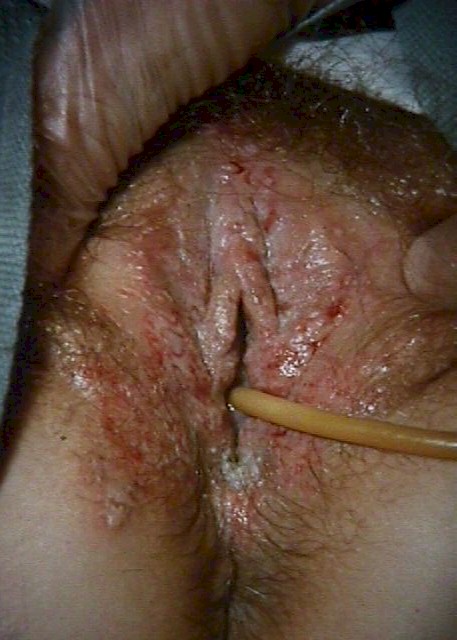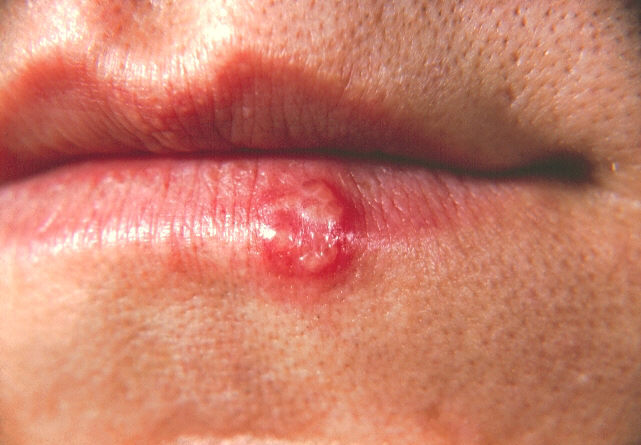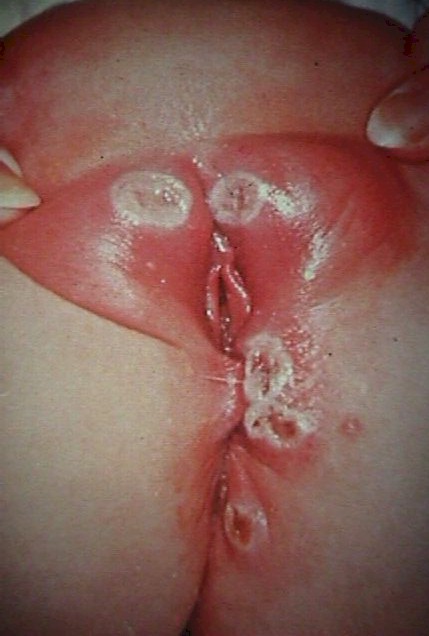
Herpes Vulvitis

Herpes Vulvitis

Herpes Simplex Type I

Pediatric HSV in a Child Abuse Victim |
 A tingling or itching sensation precedes the development of painful
blisters on both sides of the vulva in acute herpes infection. The blisters then break
open, releasing clear fluid, and form shallow ulcers, filled with grayish material. The
ulcers then crust over and when the crusts fall off, the underlying skin looks normal. The
process takes 7-10 days. A tingling or itching sensation precedes the development of painful
blisters on both sides of the vulva in acute herpes infection. The blisters then break
open, releasing clear fluid, and form shallow ulcers, filled with grayish material. The
ulcers then crust over and when the crusts fall off, the underlying skin looks normal. The
process takes 7-10 days.During the ulcerative stage, the pain may be so intense as to require narcotic
analgesia. Urinating during this time can be extremely painful due to the hot, salty urine
coming in contact with the open sores on the vulva. The pain may be so intense as to
require such measures as urinating into a sitz bath or even placement of an indwelling
urinary catheter (Foley).
The diagnosis is made by the typical appearance and may be confirmed with a herpes
culture.
Although this lesion resolves spontaneously, re-occurrences are common.
Preferred treatment (CDC) for an initial outbreak is:
- Acyclovir 400 mg orally three times a day for 7-10 days, OR
- Acyclovir 200 mg orally five times a day for 7-10 days, OR
- Famciclovir 250 mg orally three times a day for 7-10 days, OR
- Valacyclovir 1 g orally twice a day for 7-10 days.
Preferred treatment (CDC) for a recurrence is:
- Acyclovir 400 mg orally three times a day for 5 days, OR
- Acyclovir 200 mg orally five times a day for 5 days, OR
- Acyclovir 800 mg orally twice a day for 5 days, OR
- Famciclovir 125 mg orally twice a day for 5 days, OR
- Valacyclovir 500 mg orally twice a day for 5 days.
- Valacyclovir 1.0 g orally once a day for 5 days.
Some individuals have frequent recurrences, as often as every several weeks. For these
women, "suppressive therapy" can be very helpful. Suppressive therapy involves
taking relatively low doses of anti-viral medication daily, in order to keep the virus
from causing such frequent attacks. Suggested regimens (CDC) for suppressive therapy
include:
- Acyclovir 400 mg orally twice a day, OR
- Famciclovir 250 mg orally twice a day, OR
- Valacyclovir 500 mg orally once a day, OR
- Valacyclovir 1.0 gm orally once a day.
Another component of a herpes outbreak can be a bacterial superinfection. During the
ulcerative stage, skin bacteria (strep, staph, coliforms) can attack the exposed ulcers,
causing a bacterial infection of the ulcer. This is particularly true of large or
multiple, confluent ulcers. These women may benefit (faster recovery and less pain) by the
use of antibiotics such as amoxicillin, any cephalosporin or erythromycin, even though
those drugs will have no effect on the course of the viral component of the herpes.

CDC Treatment Guidelines
|